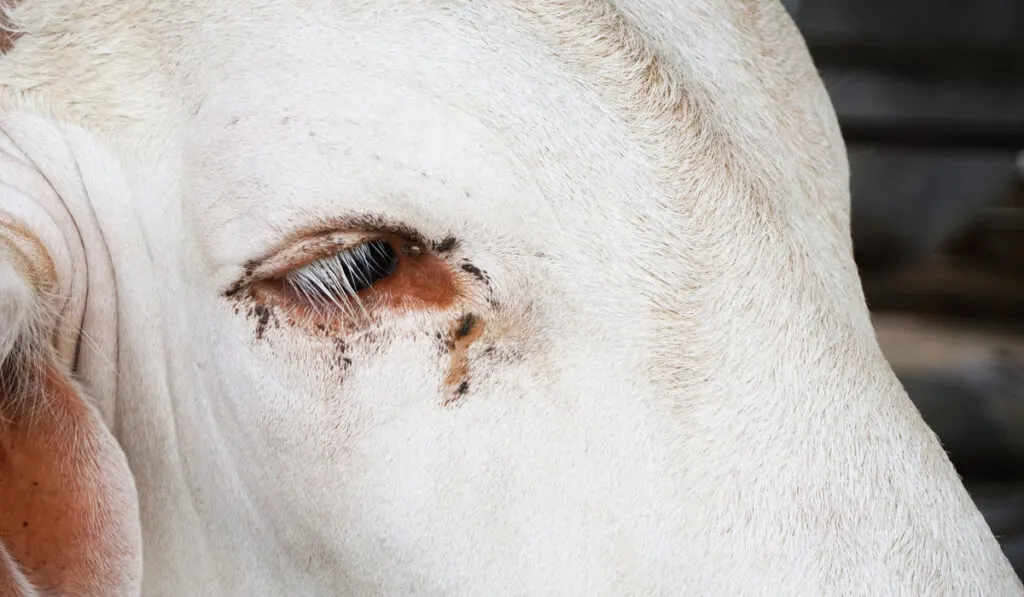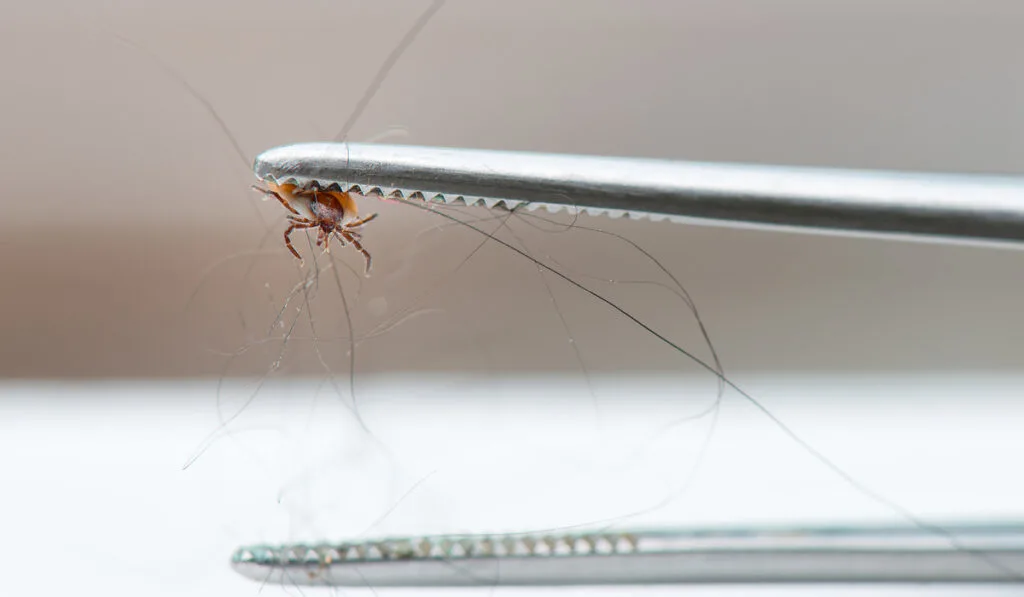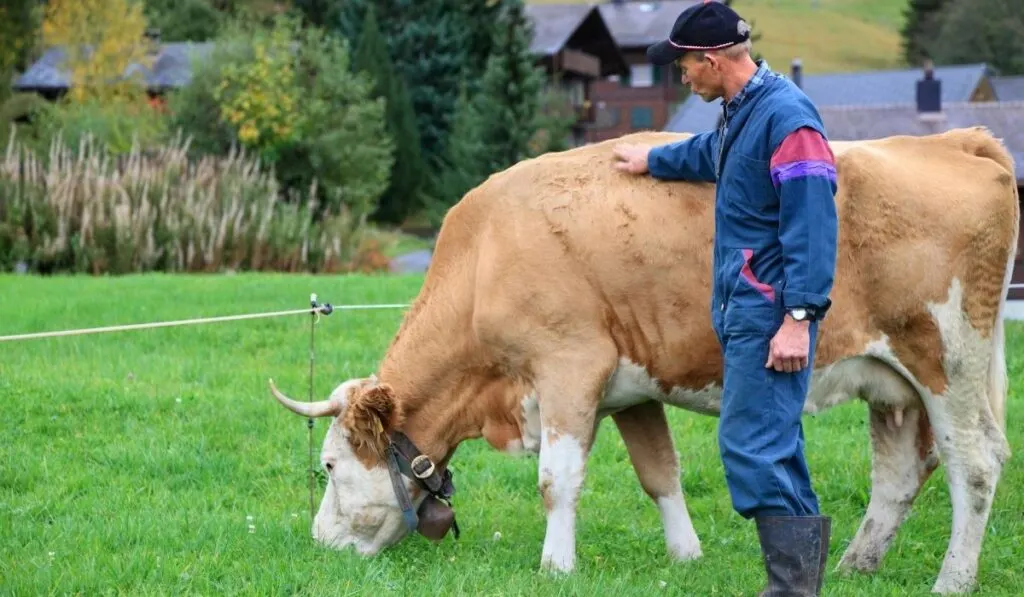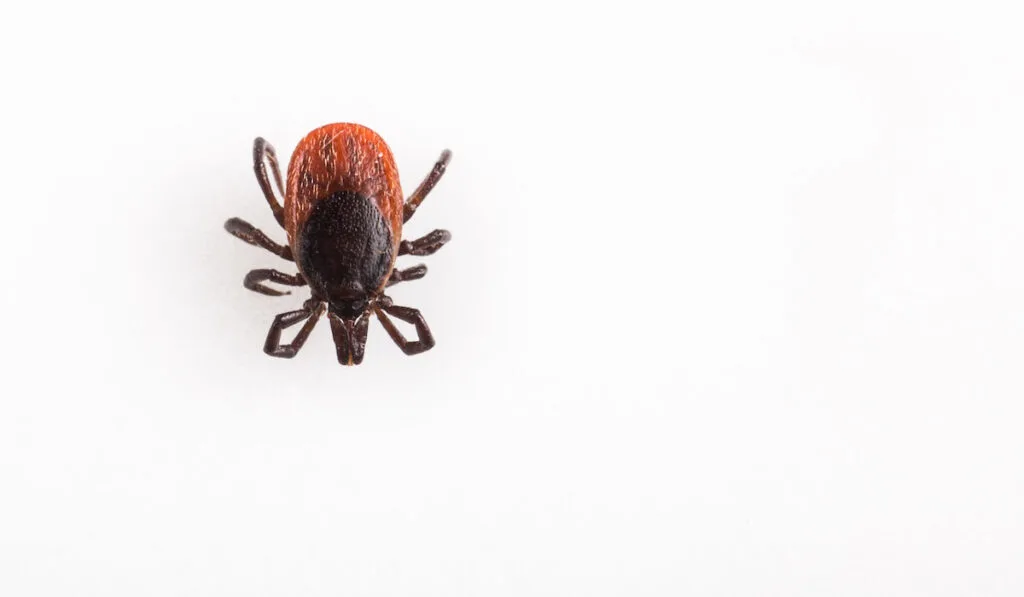Raising cows is fun and easy until your cows are sick and you don’t know what to do.
One common way cows can get sick is when they have parasites such as nematodes, mites, ticks, etc. What are ticks? Can cows get ticks? If so, how can you remove them?
There are several methods of removing ticks from cows. Some effective methods are by pulling the ticks out using tweezers, applying acaricides, etc. You have to be careful, however, so that you do not hurt your cow.
There are a lot of questions about how to prevent ticks from bothering your cows and common parasites of cows. We will cover those and more in this article.

Table of Contents
Ticks on Cows
How do you know that your cow has ticks? There are several ways to identify ticks on cows. Finding a few ticks on your cow is not a death sentence, so you should not panic. But first of all, what are ticks?
What Are Ticks?
Ticks are arachnids in the Acari subclass. They have a large and round abdominal and they burrow their head deeply in the skin of animals (and sometimes people). There are over 850 species of ticks.
Ticks feed on the blood of their host. Most tick species have high host specificity. This means that they prefer to feed on the blood of one type of host (dogs, cats deer, etc.) and cannot be found on the body of other animals.
Some tick, species, however, can accidentally infect hosts that are not in their preferred species.
Can Cows Get Ticks?
Cows can get ticks. The most common tick species found on cows is the Asian Blue Tick (Rhipicephalus microplus). This tick species is found on a wide range of livestock. Another tick species that can be found on cows is the Bush Tick (Ixodes holocyclus).
Cows can get ticks from other cows and animals infected with ticks. Cows can also get ticks from grasses (when ticks are looking for a host, they wait on grass blades for their host).
Some symptoms of ticks include:
- Hair Loss: Hair loss is common when cows with hair have ticks. You will notice some parts of their skin are exposed because of ticks.
- Skin Irritation: You should see some red or bumpy patches in the skin of your cows with ticks. Check behind the ears and at the joint of the legs of your cows.
- Anemia: Anemia is the loss of blood. Cows with a high infestation of ticks can develop anemia and lose weight.
- Lyme Disease: These are rashes that have bull’s eye patterns. Lime disease is caused by the Borrelia burgdorferi bacterium. Deer ticks that can infect deer and cattle carry this disease.
- Secondary Infections: The injury caused by ticks can give access to bacteria and other pathogens to cause secondary infections.
As you can see, you need to remove ticks from your cow immediately when you spot them.
How Do You Remove Ticks from Cows?
Here are easy ways to remove ticks from cows:
1. Use a Pair of Tweezers

The use of tweezers is by far the easiest, safest, and most common method of removing ticks from your cows. When pulling out the tick, make sure that you carefully remove the head of the tick as well.
If you do not remove the head, it will start decomposing and it may lead to secondary infections.
2. Use Acaricides
Acaricides are pesticides for ticks. They are effective in killing and preventing ticks. You should use acaricides in August because that is when ticks usually start to look for their hosts. Spray acaricides on regions with ticks.
Make sure you contact your vet for the best product to use for your cow and for further directions.
3. Use Methylated Spirit or Tea Tree Oil
Just like acaricides, methylated spirit (as well as tea tree oil) can deter ticks. Methylated spirit and tea tree oil are safer for cows than acaricides.
Remember to contact your vet.
4. Use Oral Treatments
Nexgard and other oral doses can help remove ticks from your cows. Before using oral treatment, make sure that it is safe for your breed of cow.
5. Call a Local Vet
The best way to remove ticks from your cow depends on the species of tick and the breed of your cow. This means that a vet or expert homesteader should help you with the best and safest method to use.

How Do You Prevent Cows from Getting Ticks?
Here are a few ways to keep cows safe from ticks:
1. Regularly Inspect the Body of Your Cows
You should always examine the body of your cows for ticks. Inspect your cows from August till early November as most tick infestations are recorded in that period. If you find ticks, remove them immediately.
You should also isolate the cow and make sure that it is tick-free before you let it mix with others.
2. Mow Your Pastures Often
Ticks wait for cows and other hosts on grass blades and tall leaves. To prevent ticks from reaching your cows, do not allow grasses to grow too tall.
Ticks will move to other areas if there are no tall leaves or grasses around your barn.
3. Isolate New Cows and Inspect Them First
When bringing a new cow to join the herd, you should examine it for parasites such as ticks before allowing it to mix with the others.
Aside from the prevention of ticks, it is a good practice to isolate new animals until they are used to the environment before you allow them to mix with others.
4. Do Not Give Wild Animals Access to Your Pasture
Wild animals can give ticks to your cows. You should use a fence to prevent wild animals from reaching your cows.
5. Raise Birds
Birds such as chickens, turkeys, guinea fowl, and pheasants love eating ticks. If you raise such birds, they will look for ticks in pasture and eat them.
With birds around, your cows are safe from ticks.
6. Keep the Soil Dry
Ticks love a moist environment. You should keep the soil dry. One great way to keep the soil dry is to remove dead leaves and organic matter from the soil surface.
This means that when you mow the grass, you should remove the clippings to make the place uninhabitable for ticks.
7. Prevent Rats and Other Pests from Entering Your Barn
To prevent rats, make sure that grains and other foods are stored properly so that rats will not enter your barn. Asides from ticks, rats can also carry other disease-causing parasites to your barn.
These tips should help you prevent ticks from reaching your cows.
Related Questions and Answers
1. Can Ticks Kill Cows?

It is not common for ticks to kill cows. Unless your cow is infected with Lyme disease or a secondary infection, ticks cannot kill cows.
Ticks, however, can cause anemia when there are too many on the body of your cow. You should remove ticks from your cow as soon as you find them.
2. Are There Other Parasites of Cows that are Similar to Ticks?
Here are other common parasites of cows:
- Fleas
- Mites
- Nematodes
- Tapeworms
- Bacteria, Fungi, and Other Microbes
You may also check this article to know more.
3. Do Goats, Pigs, and Other Livestock Have Ticks?
There are various tick species that prefer goats, pigs, etc. These ticks can also move from pigs, goats, etc. to cows accidentally, so you should isolate infected animals until they are free from ticks.
Final Thoughts
Cows can get ticks, so you need to keep your cows safe from ticks and other parasites.
There are several methods to remove ticks from your cows, so you need to choose the best and right method for you.
You should also prevent ticks from reaching your cows.
When in doubt, call your vet. They can help you get your tick problem under control and keep your cows as healthy as possible.
Resources
- https://www.vetcentre.net.nz/cattle-ticks/
- https://animals.mom.com/tick-control-cattle-11372.html
- https://tickapp.tamu.edu/control.html#cattle
